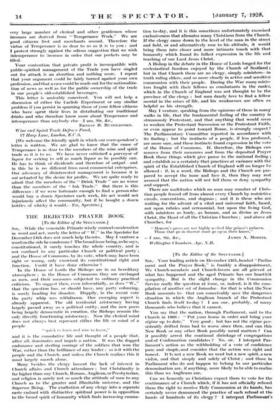THE REJECTED PRAYER BOOK
[To the Editor of the SPECTATOR.] Sin,7-11'hik the venerable Primate wisely counsels moderation in word and act, surely the letter of " W." in the Spectator for December 24th does not much help thereto. May I venture a word on the side he condemns ? The broad issue being, as he says, constitutional, it surely touches the whole country, and is not confined to any partkular Church or political party ; and the House of Commons, by its vote, which may have been right or wrong, only exercised its constitutional right and function. Could it have done otherwise ?
In the ,House of Lords the Bishops are in an hereditary atmosPhere ; in the House of Commons they are envisaged as men, and their measures subjected to ordinary practical criticism. To suggest then, even inferentially, as does "W.," that the question has, or should have, any party colouring, is surely heading for disaster. Happily, in. the recent vote the party whip was withdrawn. One emerging aspect is already apparent. The old territorial aristocracy having largely passed away as a political entity, and the new peers being largely democratic in creation, the Bishops remain the only directly functioning aristocracy. Now the clerical mind does not always best represent either the life or mind of a people
" quick to learn and wise to know,"
and it is the cumulative life and thought of a people that, after all, dominates and impels a nation. It was the dogged endurance and sterling courage of the soldiers that won the War, rather than the brilliance of any leader ; so is it with the people and the Church, and unless the Church realizes this it must largely march alone.
Many besides the clergy lament the lack of interest in Church affairs and Church attendance ; but Christianity is far higher than any Church, Roman, Anglican, or Presbyterian, and religion is surely not so much the attitude of man to any Church as to the greater and illimitable universe, and the Supreme Being. The exaltation of any clergy into a separate caste endued with distinctive spiritual power is in opposition to the broad spirit of humanity which finds increasing emana-
tion to-day, and it is this sometimes unfortunately exercised exclusiveness that alienates many Christians from the Church. If the clergy came down to the level of the man in the street and field, or and alternatively rose to his altitude, it would bring them into closer and more intimate touch with that humanity which found its fullest expression in the life and teaching of our Lord Jesus Christ. .
A Bishop in the debate in the House of Lords longed for the ecclesiastical freedom enjoyed by the Church of Scotland ; but in that Church there are no clergy, simply, ministers—in truth ruling elders, and so more closely in active and sensitive communion with their people. During the War many minis- ters fought with their fellows as combatants in the ranks; which in the Church of England was not thought to be the province of the clergy ; but men dearly love to find a fellow mortal in the crises of life, and his weaknesses are often as helpful as his strength.
May I venture, speaking from the opinions of those in many walks in life, that the fundamental feeling of the country is strenuously Protestant, and that anything that would seem to weaken the Protestant Succession or the Protestant Faith, or even appear to point toward Rome, is strongly suspect ? The Parliamentary Committee reported in accordance with its finding ; but the instincts of a people, if less profound, are more sure, and these instincts found expression in the vote of the House of Commons. If, therefore,- the Bishops can remove from their measures and from the deposited Prayer Book those things which give pause to the national feeling ; and establish as a certainty that practices at variance with the spirit of the Established Church of England will no longer be alloWed : if, in a word, the Bishops and the Church are pre- pared to accept the issue and face it, then they may rest assured that the nation will not fail them or deny sympathy and support.
There are multitudes which no man may number of Chris- tian people fenced off from almost every Church by restrictive creeds, conventions, and dogmas ; and it is these who are waiting for the advent of a vital and universal faith, based, not upon rubrics and ceremonial, but upon the living God, with ministers as lowly, as human, and as divine as Jesus Christ, the Head of all the Christian Churches ; and above all Churches, for
" Heaven's gates are not highly arched like prince's palaces. Those that go in thereat must go upon their knees." .
am, Sir, &c., JAMES A. Mounts.
Wellington C'hambers, Ayr, N.B.






































 Previous page
Previous page